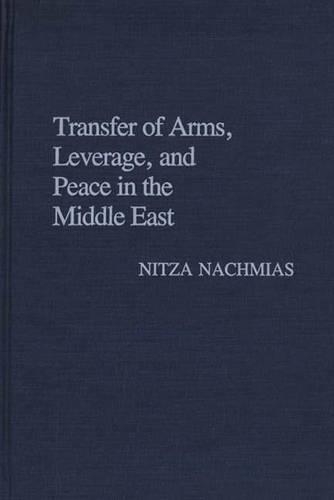
Transfer of Arms, Leverage, and Peace in the Middle East
(Hardback)
Publishing Details
Transfer of Arms, Leverage, and Peace in the Middle East
By (Author) Nitza Nachmias
Bloomsbury Publishing PLC
Praeger Publishers Inc
18th November 1988
United States
Classifications
Tertiary Education
Non Fiction
956.04
Physical Properties
Hardback
208
Description
Although Israel has been primarily dependent on U.S. arms for its national security since 1968, supplying military aid has not conferred the degree of policy leverage anticipated by the United States. This study is the first to analyze the reasons why the tactics of transferring or withholding arms have failed to achieve U.S. foreign policy goals in the Middle East. Providing a thorough, up-to-date reexamination of the U.S.-Israeli relationship, Nachmias gives a comprehensive account of U.S. Middle East policy from 1968 to 1988 and explores the international and regional dilemmas that have undercut U.S. policy initiatives for peace. Nachmias argues that the use of military aid to achieve foreign policy goals ignores the regional conditions that control Middle East politics and does little to advance the peace process or enhance U.S. power in the region. To promote these objectives, she suggests alternative approaches, including the creation of a coherent and consistent U.S. policy for the region and a stronger and more innovative diplomatic role. One of the few analyses to consider international policy questions in terms of leverage between client and patron states, Nachmias's work significantly enlarges our understanding of the complex forces that will continue to shape the Middle East situation in the coming decades. Her book will be a valuable resource for scholars, officials, and students specializing in U.S. politics and foreign policy and Middle East studies.
Reviews
A study of leverage in US-Israeli relations since the 1960s, particularly Washington's efforts to use military aid to gain Israeli cooperation in the Middle East peace process. Nachmias, is an Israeli expert on international politics. He distinguishes leverage from power and influence, and contends that leverage is determined by external rather than domestic political factors. In the Middle East, conflicting US regional and global interests created dilemmas that undermined American leverage. In other words, Washington's inability to gain leverage over Israel cannot be attributed primarily to the protective Congress, public opinion, or the Israeli lobby.' Nachmias concludes that long-term political considerations, expectations, and relationships are at least as important as leverage in patron-client state relations, and the effective US leverage must await a major change in the regional and international environments. This provocative study revisits and expands on similar themes developed in David Pollock's The Politics of Pressure: American Arms and Israeli Policy Since the Six Day War. It is aimed at specialists and should be considered by larger college and university libraries as well as collections devoted to international politics, US foreign relations, and the modern Middle East.-Choice
"A study of leverage in US-Israeli relations since the 1960s, particularly Washington's efforts to use military aid to gain Israeli cooperation in the Middle East peace process. Nachmias, is an Israeli expert on international politics. He distinguishes leverage from power and influence, and contends that leverage is determined by external rather than domestic political factors. In the Middle East, conflicting US regional and global interests created dilemmas that undermined American leverage. In other words, Washington's inability to gain leverage over Israel cannot be attributed primarily to the protective Congress, public opinion, or the Israeli lobby.' Nachmias concludes that long-term political considerations, expectations, and relationships are at least as important as leverage in patron-client state relations, and the effective US leverage must await a major change in the regional and international environments. This provocative study revisits and expands on similar themes developed in David Pollock's The Politics of Pressure: American Arms and Israeli Policy Since the Six Day War. It is aimed at specialists and should be considered by larger college and university libraries as well as collections devoted to international politics, US foreign relations, and the modern Middle East."-Choice
Author Bio
NITZA NACHMIAS is on the faculty of the City College of New York. Her articles on international relations have appeared in U.S. and Israeli journals.
